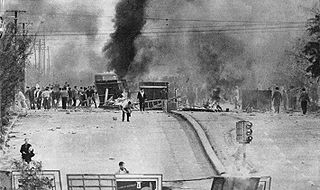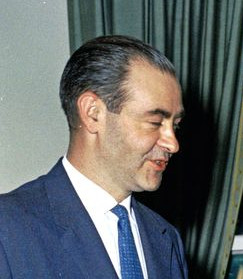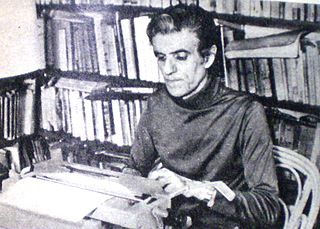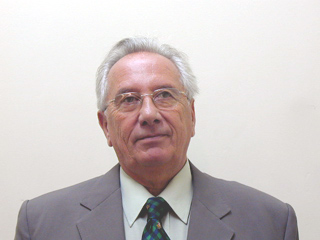
Pedro Eugenio Aramburu Silveti was an Argentine Army general and dictator who served from November 13, 1955 to May 1, 1958. He was a major figure behind the Revolución Libertadora, the military coup against Juan Perón in 1955. He was kidnapped by the left-wing organization Montoneros on May 29, 1970 and assassinated as part of retaliation. He had been involved in the June 1956 execution of Army General Juan José Valle—associated with the Peronist movement— and 26 Peronist militants, after a botched attempt to overthrow his regime.

The University of Buenos Aires is a public research university in Buenos Aires, Argentina. Established in 1821, it is the premier institution of higher learning in the country and one of the most prestigious universities of Ibero-America. It has educated 17 Argentine presidents, produced four of the country's five Nobel Prize laureates, and is responsible for approximately 40% of the country's research output. The QS World University Rankings currently places the UBA at number 67, the highest ranking university in the Spanish-speaking world.

The Cordobazo was a civil uprising in the city of Córdoba, Argentina, at the end of May 1969, during the military dictatorship of General Juan Carlos Onganía, which occurred a few days after the Rosariazo, and a year after the global protests of 1968. Contrary to previous protests, the Cordobazo did not correspond to previous struggles, headed by Marxist workers' leaders, but associated students and workers in the same struggle against the military government.
Alejandro Rozitchner is an Argentine writer. "Artist of the ideas" or "intellectual nutritionist" are some of the names with which he describes his work. He is characterized by his affirmative thinking, his appreciation for enthusiasm, and for his open, casual, and provocative style.

Roberto Alemann was an Argentine lawyer, economist, publisher, and academic.

Federal Peronism, also known as Dissident Peronism is the faction or branch of either moderate, centrist or right-wing Peronism, that is currently identified mostly by its opposition to the ruling Kirchnerism, the left-wing faction of Peronism.

Juan José Pérez Sebreli is an Argentine sociologist, essayist and philosopher. Throughout his intellectual work, he concentrated on the notions of reason, city and everyday life.
Omar Acha is an Argentine historian and political essayist. He is a researcher at the Consejo Nacional de Investigaciones Científicas y Técnicas and also at the Centro de Investigaciones Filosóficas (Argentina). He teaches Philosophy of History at the Universidad de Buenos Aires. He was also a member of the editorial board of Herramienta. Revista de Teoría y Crítica Marxista, published in Buenos Aires.

Marta Lynch was the pseudonym of Marta Lía Frigerio, an Argentine writer. She wrote seven novels and nine collections of short prose.

Mariano Recalde is an Argentine lawyer and Justicialist Party politician. He currently serves as a National Senator for the Autonomous City of Buenos Aires since December 2019, representing the Frente de Todos. He previously served as a Legislator at the Buenos Aires City Legislature and as president of Aerolíneas Argentinas, Argentina's state-owned flag carrier airline from 2009 to 2015.

Gonzalo Garcés is an Argentine editor and writer known for his writing on masculinity, and for his criticisms of feminism. He also contributes to newspapers and magazines such as La Nación, Clarín, El Mercurio, Reforma, Brecha, Gatopardo, Perfil, El País and Quimera.

Alberto Emilio Nadra is an Argentinean politician, writer and journalist of Marxist formation. He stood out as a human rights activist and also in the constitution of the Argentinean Youth Political Coordination between 1970 and 1980.

Héctor Recalde was born on 28 May 1938 in Buenos Aires. He is an Argentine lawyer and politician who specializes in labor and political law. He was a national deputy for Buenos Aires province between 2005 and 2017. He was the spokesman for the Front for Victory in the Chamber of Deputies.
Viviana Gorbato was an Argentine journalist, writer, and university professor.

María Romilda Servini de Cubría is an Argentine lawyer and judge who presides over Federal Court No. 1 of Buenos Aires.

Fernando Nadra was an Argentine lawyer, journalist and public speaker. He was one of the most important leaders of the Partido Comunista Argentino and, from his Marxist ideological perspective, took part in most of the important political debates of his time. He stood out from other left-wing leaders of his time for his abilities as an organizer and collective activist, and his numerous attempts to promote agreement among different political sectors through pluralistic dialogue.

Dora Beatriz Barrancos is an Argentine researcher, sociologist, historian, feminist, and politician.

Editorial Haynes was an Argentine publishing company founded by Alberto M. Haynes in 1904. The publisher released several magazines such as El Hogar, Mundo Deportivo, Mundo Argentino, Mundo Agrario, Mundo Infantil, and newspaper El Mundo, among other imprints.

Antonio Juan Benítez was an Argentine politician. Initially a member of the Radical Civic Union, he later became a supporter of General Juan Perón, and served in several important positions during the successive peronist governments.

Unzué Palace, also known as Quinta Unzué, was the presidential residence of the Argentine Republic during the presidency of Juan Domingo Perón (1946-1955), and became a place of pilgrimage and cult after the death of Eva Perón in 1952. The building's symbolic importance was such that, after the military coup that led to Perón's downfall in 1955, the dictators who subsequently took power ordered its complete demolition, in order to erase all traces of its former occupants.

















